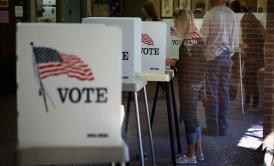A new poll out today suggests that GOP accusations of intentional manipulation on the part of pollsters are resonating with the American public.
Roughly 42 percent of those surveyed by left-leaning Public Policy Polling said pollsters were manipulating their data in order to show President Obama with a lead, while 40 percent said that wasn’t the case. The remaining 18 percent said they were not sure what to think.
The exact wording of the question: “Do you think pollsters are intentionally skewing their polls this year to help Barack Obama, or not?”
The results show that self-identified Republicans were particularly likely to buy into the pollsters-are-against-us conspiracy theory, with 71 percent saying that the recent major polls showing President Obama pulling ahead nationally and in key battleground states are biased against their candidate. That number balloons to 84 percent when we’re talking exclusively about those respondents who said they were members of the Tea Party.
Independents, meanwhile, were more evenly split, but also expressed their own doubts about the pollsters. Forty-five percent said they saw deliberate tampering, compared to 40 percent who said they think the polls are accurate. A small chunk of Democrats (14 percent), likewise, thought the polls are unfairly favoring their candidate, while 65 percent thought the pollsters were offering a fair look at the state of the race.
A refresher for those who haven’t been following the whole skewed/unskewed debate: In short, a growing number of conservatives contend that pretty much everyone but the conservative pollsters over at Rasmussen are relying on turnout models that unfairly favor Democrats. If the turnout models were tweaked appropriately, they say, Romney would have a substantial lead heading toward November.
Frank Newport, the editor-in-chief over at Gallup, penned a forceful response to the polling critics last week, explaining that their main beef with the numbers—what the doubters say is an oversampling of Democrats in the survey—actually is just further proof that the president is out in front at the moment. Individual party identification is “designed to vary,” Newport explained, because it “changes as political tides change.” More Newport:
“So, it would not be surprising to find that if Barack Obama is enjoying a surge in popularity in any given state, that surge will show up on the ballot question, on his job approval measure, and on the measure of party identification. So, data showing that Obama is ahead on the ballot in a specific state poll and that Democrats have a higher-than-expected representation on the party identification question, are basically just reflecting two measures of the same underlying phenomenon.”
That explanation, however, has done little to convince conservative pundits that the polling data is on the straight and narrow. And, by the looks of the PPP poll, unless that happens, Republican voters in general are unlikely to accept any poll that shows Obama with a lead coming down the home stretch.
